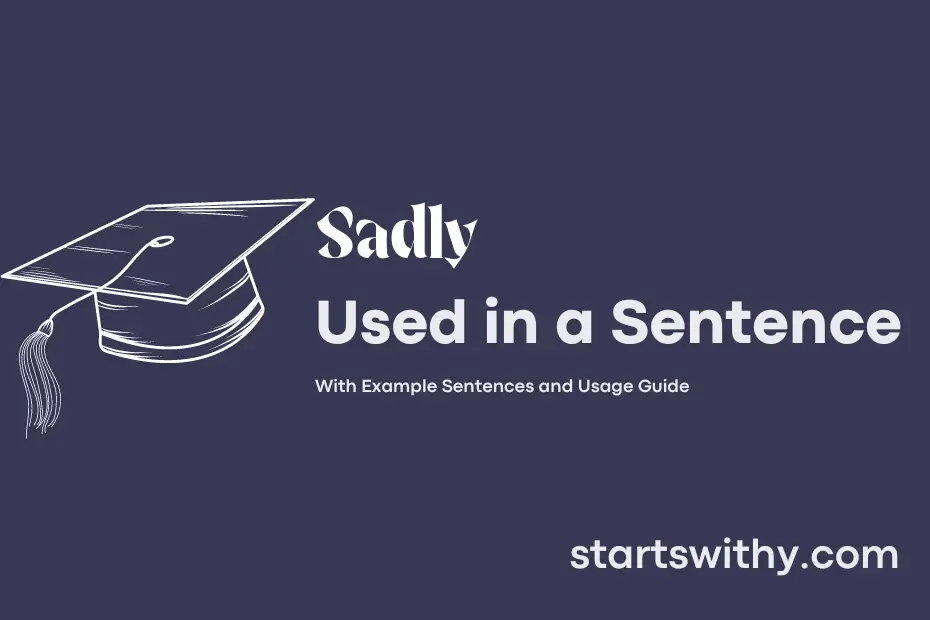Ever wondered how to express disappointment or sorrow in a concise manner? Look no further, as I will guide you through the usage of the word “sadly” in crafting effective and emotional sentences.
“Sadly” is an adverb that conveys a sense of regret, unhappiness, or disappointment in a sentence. It is commonly used to indicate a negative outcome, unfortunate event, or a somber realization in a straightforward manner.
7 Examples Of Sadly Used In a Sentence For Kids
- Sadly, the little bird lost its nest in the storm.
- The puppy was sadly left all alone in the park.
- Sadly, the ice cream fell on the ground before I could eat it.
- The kite flew away, and sadly, I couldn’t catch it.
- Sadly, the balloon popped when I tried to blow it up.
- The flower wilted, and I sadly watched it fade away.
- Sadly, the school bell rang before I could finish my drawing.
14 Sentences with Sadly Examples
- Sadly, the library closes early on weekends, making it difficult to find a quiet place to study.
- It can be challenging to juggle classes, internships, and extracurricular activities, sadly leading to burnout for many students.
- Sadly, the canteen food is not always the healthiest option for busy students on campus.
- Group projects can be a hit or miss, and sadly, not everyone pulls their weight in a team.
- Sadly, some professors have a strict attendance policy, making it difficult for students with other commitments.
- Financial constraints can limit students’ participation in events or trips, sadly missing out on valuable experiences.
- Despite having a passion for a particular field, sadly not all students can pursue it due to the limited availability of courses.
- Sadly, the Wi-Fi on campus can be unreliable at times, causing inconvenience during online assignments or research.
- Getting limited feedback on assignments or exams can sadly hinder students’ opportunities for improvement.
- Sadly, the career guidance center is often underutilized by students seeking help in planning their future paths.
- Balancing social life and academics can be a struggle, and sadly, some students prioritize one over the other leading to imbalances.
- Sadly, some students face discrimination or bias based on their background or beliefs, affecting their overall college experience.
- Student organizations can offer valuable opportunities for growth, but sadly, not all students take advantage of these extracurricular activities.
- The pressure to excel academically can be overwhelming, and sadly, some students resort to unhealthy coping mechanisms.
How To Use Sadly in Sentences?
Sadly is an adverb that expresses sorrow, regret, or disappointment in a sentence. It is used to convey a sense of sadness or disappointment about a situation or outcome.
When incorporating Sadly into a sentence, it should be placed at the beginning or in the middle to emphasize the feeling of sadness or regret. For example:
– Sadly, we had to cancel our trip due to bad weather.
– We were excited to see the fireworks display, but sadly, it was canceled.
To effectively use Sadly, consider the tone and context of the sentence. It is best used in situations where a sense of disappointment or regret is being expressed. Avoid using it in overly formal or technical writing where a more neutral tone is required.
Remember that Sadly should be followed by a comma if it appears at the beginning of a sentence. This helps to separate it from the rest of the sentence and emphasizes the feeling of sadness or regret.
In summary, Sadly is a powerful word that can convey deep emotions in a sentence. By placing it strategically and considering the context, you can effectively express sorrow or disappointment in your writing.
Conclusion
In conclusion, the use of the keyword “sadly” in sentences conveys a sense of regret, disappointment, or sorrow. It serves as a clear signal to the reader that the information being presented is not positive or happy. By incorporating “sadly” into sentences, writers can enhance the emotional impact of their message and create a more empathetic connection with their audience.
Whether used to express sympathy, acknowledge a negative outcome, or emphasize a disappointing turn of events, “sadly” adds a layer of sincerity and emotion to written communication. Its straightforward and direct approach makes it a powerful tool for evoking empathy and understanding in a variety of contexts.



